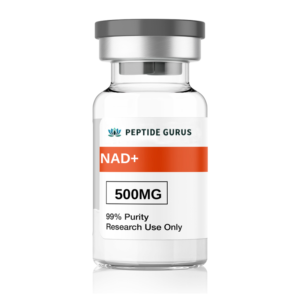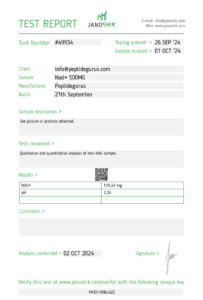In recent years, the study of
NAD+ peptide has emerged as a fascinating area of research, especially in the context of neurodegenerative diseases. NAD+ (Nicotinamide Adenine Dinucleotide) peptide, an oxidized form of NADH, plays crucial roles in various biological processes, and its potential impact on neurodegenerative conditions has caught the attention of the scientific community.
Understanding NAD+ Peptide
NAD+ is not just a simple molecule; it is involved in over 500 enzymatic reactions within the body. Endogenously, it is synthesized through a de novo pathway that starts with the amino acid tryptophan. The process involves several enzymatic steps and key constituents such as tryptophan, nicotinamide, nicotinic acid, nicotinamide riboside, and nicotinamide mononucleotide. As a coenzyme, NAD+ participates in redox reactions, shuttling electrons from one reaction to another, which is fundamental for intracellular energy transfer. It also has functions in extracellular domains in certain situations. It might be involved in enzyme modulation, posttranslational modifications of proteins, and even intercellular communication. NAD+ has been found to be released from neurons in areas like blood vessels, the urinary bladder, the colonic tract, and specific neural regions in the brain.
The Link to Neurodegenerative Diseases
Neurodegenerative diseases, such as Alzheimer’s, Parkinson’s, and Huntington’s, are characterized by the progressive loss of neuronal structure and function. A common feature in many of these diseases is a decline in NAD+ levels in the affected tissues. For example, in Alzheimer’s disease, studies have shown that lower NAD+ concentrations are associated with increased oxidative stress and inflammation in the brain. Mitochondrial dysfunction, which is a hallmark of neurodegenerative diseases, is also closely related to NAD+ levels. Mitochondria, often referred to as the powerhouses of the cell, are not only responsible for energy production but also play roles in intracellular signaling, innate immunity regulation, and stem cell dynamics. As we age, mitochondrial function deteriorates, and this is associated with a decrease in NAD+ levels. Some research indicates that restoring NAD+ levels through dietary supplements or other means might potentially reverse some of the age – linked mitochondrial degeneration, which could have implications for neurodegenerative disease treatment.

FDA’s Role and Guidance in Peptide Research
The FDA (Food and Drug Administration) has provided draft guidance on clinical pharmacology considerations for peptide drug products. This guidance is crucial for the development of peptide – based therapies, including those related to NAD+ peptides. The FDA’s guidance focuses on several aspects such as hepatic impairment, drug – drug interactions (DDIs), QT prolongation risk, and immunogenicity risk, all of which are important when considering the development of a NAD+ peptide – based treatment for neurodegenerative diseases.
- Hepatic Impairment: Peptides are mainly degraded by proteases. However, specific peptide characteristics can lead to hepatic impairment. For example, if a peptide has substantial hepatic metabolism (more than 20%), it may pose an increased risk of plasma exposure. Structural modifications, like in cyclic peptides, can make them susceptible to liver enzyme metabolism. The FDA requires detailed studies on how hepatic impairment might affect the metabolism and clearance of NAD+ peptides.
- Drug – Drug Interactions: Generally, peptide drug products are not CYP enzyme substrates as they are metabolized by proteolytic enzymes. But for some structurally modified peptides, like cyclic peptides, there can be interactions with CYP metabolism or transporters. In the case of NAD+ peptides, if they are being developed in combination with other drugs for neurodegenerative disease treatment, understanding potential DDIs is essential.
- Immunogenicity Risk: Peptide drug products, including NAD+ peptides, can have immunogenicity risks. Product – specific factors (such as molecular size, structure, and purity), process – specific factors (host cell proteins and impurities), subject – specific factors (disease state and genetic predisposition), and study – specific factors (dosing regimen and administration route) all need to be carefully evaluated. The FDA recommends a tiered approach for immunogenicity assessment, including developing assays for anti – drug antibody (ADA) detection, evaluating ADA titers and their effects on pharmacokinetics and pharmacodynamics, and investigating both within – subject and between – subject comparisons.
Our NAD+ Peptide Product
Our NAD+ peptide product comes in a 500 mg lyophilized powder form in a 5 ml vial. It has a high purity of ≥ 99%. The product has the chemical formula C21H27N7O14P2, a PubChem CID of 5893, and a CAS number of 53 – 84 – 9, with a molecular weight of approximately 663.43 g/mol. Synonyms for NAD+ include nicotinamide adenine dinucleotide, coenzyme I, β – NAD, and NADH. It is important to note that the product requires reconstitution with a solvent such as bacteriostatic water. It should be stored at – 10 °C, sealed, away from heat, light, and moisture to maintain its quality. This product is designed for research purposes and can be a valuable tool in further exploring the potential of NAD+ peptides in neurodegenerative disease research, helping scientists to better understand its mechanisms of action and potential therapeutic applications within the framework of FDA’s regulations.
FAQs
- Q: Can I take the NAD+ peptide product directly as a supplement to prevent neurodegenerative diseases?
A: Currently, our NAD+ peptide product is for research use only. While NAD+ shows potential in neurodegenerative disease research, it has not been approved as a consumer supplement for prevention or treatment. The FDA has strict regulations regarding the approval of drugs and supplements, and more research is needed to determine its safety and efficacy for human consumption in this context.
- Q: How does the storage condition affect the quality of the NAD+ peptide product?
A: The NAD+ peptide should be stored at – 10 °C, away from heat, light, and moisture. Heat can accelerate chemical reactions that may degrade the peptide. Light can also cause photochemical reactions, altering the structure of the peptide. Moisture can lead to hydrolysis, breaking down the peptide into smaller fragments. Proper storage ensures that the peptide maintains its high purity and integrity for reliable research results.
- Q: Are there any potential side effects of using NAD+ peptide in research on cell cultures or animal models for neurodegenerative diseases?
A: In research settings, potential side effects can vary depending on factors such as the dose used, the species of the animal model, or the type of cell culture. For example, in some cases, high doses of NAD+ peptides might lead to altered metabolic pathways in cells, which could be misinterpreted as normal physiological responses. In animal models, it could potentially affect other organs’ functions due to systemic circulation. However, these effects are still being studied, and understanding them is part of the research process to determine the safe and effective use of NAD+ peptides in the context of neurodegenerative disease research.

